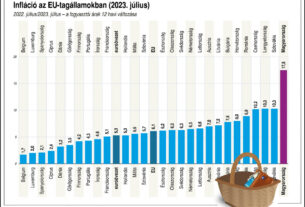Vietnam is Hungary’s key partner in South-East Asia, Speaker of Parliament László Kövér said on Monday, after talks with Vuong Dinh Hue, the head of Vietnam’s National Assembly.
While agricultural exports to Vietnam surpass imports, Hungary has “much to do” in developing bilateral economic ties, Kövér said in a joint statement after the talks. Noting that Hue led a delegation of various experts, Kövér said the visit was “promising” regarding inter-governmental, scientific and educational cooperation. The heads of parliament discussed the tied-aid programme Vietnam extended to the Hungarian parliament during the coronavirus pandemic. Kövér said the global economy was “hopefully getting back on track”, including key sectors like tourism, one of the most dynamically developing economic areas.
Hue noted the two countries’ “long historic friendship”, despite the geographical distance. The visit strengthened the strategic cooperation between Hungary and Vietnam, he said. He said the talks focused on inter-parliamentary and economic cooperation, as well as on opportunities to develop ties in science, research and education. Several university rectors were members of the Vietnamese delegation, in hope of building cooperation with Hungarian universities, he said. The Institute of Hungarian Culture is scheduled to open this year in Vietnam, he added. After the talks, the speakers signed cooperation agreements between the Hungarian parliament and the Vietnamese National Assembly, as did the two countries’ justice ministries. Hue is scheduled to meet Prime Minister Viktor Orbán on Tuesday.
Addressing a Hungarian-Vietnamese legislation seminar in Parliament later on Monday, Kövér underscored Hungary’s commitment to achieving international sustainability, environmental and climate protection goals. Kövér noted that the United Nations General Assembly elected Csaba Kőrösi, a Hungarian diplomat, as its president earlier this month. Kőrösi served as co-chair of the organisation’s Open Working Group on Sustainable Development Goals. “The fact that Hungary was the first European Union country to ratify the Paris Agreement illustrates the decisive action our country takes on the issue of climate protection,” Kövér said. The speaker expressed Hungary’s support for the EU’s 2030 climate target plan, but said it was also important to know “who will ultimately pay for it”. Kövér noted that Hungary’s climate law targets a 40% reduction in emissions by 2030 compared with 1990 levels and commits the country to achieving climate neutrality by 2050. He said Hungary’s emissions in 2020 were 34% lower than the 1990 level.
hungarymatters.hu










